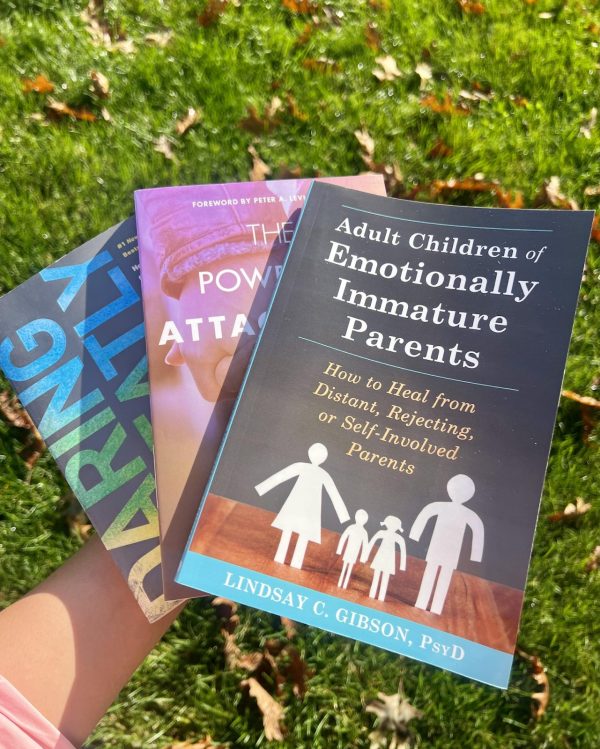| Written by Allison Rosa, MA, LAC
Imagine therapy as a vast landscape, a journey towards healing and self-discovery. While the power of therapy can truly aid in our exploration towards our inner journey with the human experience, one hour of self-exploration per week may have you feeling limited. That’s why the “work,” introspection and reflection done outside of therapy, can also be some of the most profound parts of the healing journey.
The truth is, there’s a powerful synergy between the wisdom within those pages and the compassionate guidance your therapist provides. One of my favorite supplements to provide clients between sessions is reading for self-reflection and self-compassion.
In this blog post, we’ll explore some of my favorite books as a trauma therapist, and explore who these books may be a good recommendation for. Some short synopses of the books will follow, so you can determine if this will be a good fit for yourself!
1. Adult Children of Emotionally Immature Parents by Lindsay Gibson

This book explores the impact of emotionally immature parents on their adult children as it eloquently highlights how our early relationships impact our adulthood self-image, boundaries, and codependency in adulthood. It provides valuable insights into the dynamics of these relationships, which can be fundamental in understanding and addressing the roots of trauma.
Gibson highlights four different types of emotionally immature parents, and the defense mechanisms that arise in adult children. Gibson’s book offers insights into how emotionally immature parents may undermine their children’s self-esteem through constant criticism or manipulation, illustrated through real-life stories.
I personally love the explanation of “internalized” defense mechanisms compared to “externalized” defense mechanisms. This can be an amazing supplement if you are currently in therapy processing complex childhood traumas, insecurity, and anxieties. This book has helped people understand their own defense mechanisms, and increase self-insight and reflective capacity. If you can recall childhood as a time where your emotional needs were frequently dismissed, this is a top pick for you.
Once you’ve read the first, her book Recovering from Emotionally Immature Parents is a beautiful follow-up to her insightful and educational tool.
“Children have no way of identifying a lack of emotional intimacy in their relationship with a parent. It isn’t a concept they have. And it’s even less likely that they can understand their parents are emotionally immature. All they have is a gut feeling of emptiness, which is how a child experiences loneliness… They may go to school, work, marry, and raise children, but all the while they’ll still be haunted by that core sense of emotional isolation.” – Page 2 of Chapter 1, Adult Children of Emotionally Immature Parents
2. Mother Hunger by Kelly McDaniel
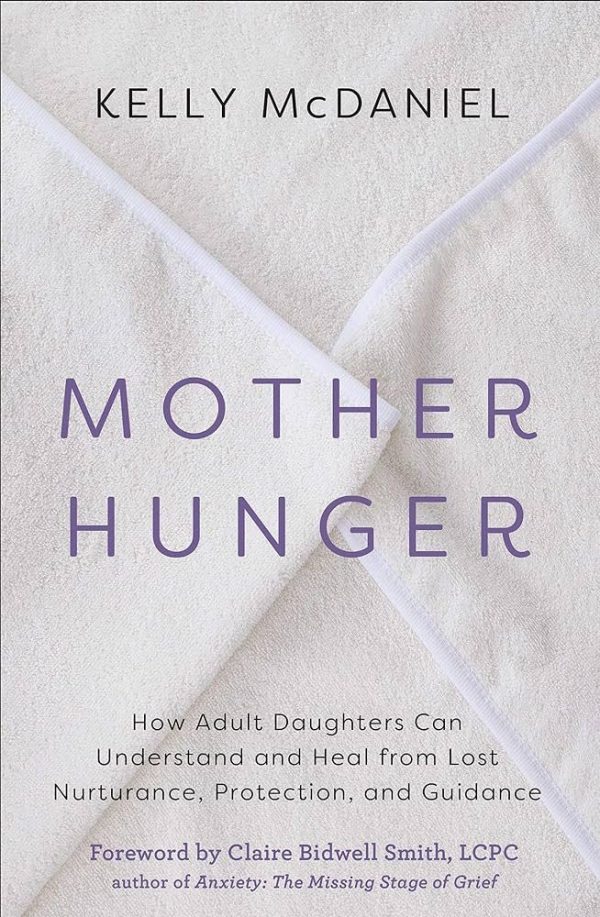 “Mother Hunger” delves into the often-overlooked topic of mother-daughter relationships and the impact they have on a woman’s life. McDaniel’s book offers a comprehensive exploration of how maternal bonds can shape self-esteem, personal identity, and emotional well-being. For example, she discusses the concept of “mother hunger,” where unmet emotional needs from childhood can manifest in various aspects of adult life. Through real-life examples and case studies, McDaniel illustrates how understanding and healing the mother-daughter dynamic can lead to personal growth and healthier relationships.
“Mother Hunger” delves into the often-overlooked topic of mother-daughter relationships and the impact they have on a woman’s life. McDaniel’s book offers a comprehensive exploration of how maternal bonds can shape self-esteem, personal identity, and emotional well-being. For example, she discusses the concept of “mother hunger,” where unmet emotional needs from childhood can manifest in various aspects of adult life. Through real-life examples and case studies, McDaniel illustrates how understanding and healing the mother-daughter dynamic can lead to personal growth and healthier relationships.
Reading this book can be an empowering step in your journey to self-discovery, whether you’re seeking to heal past wounds, or as a therapist, helping clients navigate the complexities of their own maternal relationships This is perfect for a reader who has struggled to achieve protection, guidance, and nurturing from a motherly figure. Or, who struggled with a mother’s unpredictability. Finally, the reader who was inspired by their mother, but their mother failed to be protected from their father’s anger outbursts may also enjoy this read. This is a beautifully-written book to aid with healing and seeing the inner child.
“The term Mother Hunger captures a compelling, insatiable yearning for love – the sort of love we dream about but can’t find. Many of us mistake Mother Hunger for craving for romantic love. But in truth, we are longing for the love we didn’t receive during our formative moments, months, and years” – Page 5, Mother Hunger
3. The Body Keeps The Score by Vessel Van Der Kolk
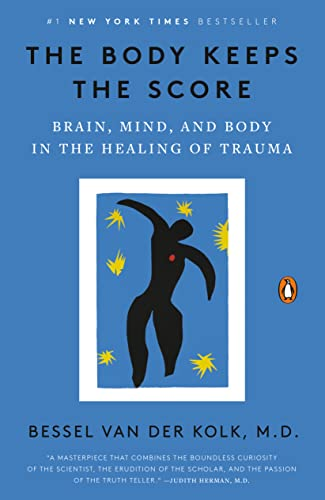 I highly recommend reading The Body Keeps the Score by Bessel van der Kolk as it provides fundamental insights into the physiological impact of trauma on the mind and body. For instance, the book details how traumatic experiences can become stored in the body, leading to physical symptoms and emotional distress.
I highly recommend reading The Body Keeps the Score by Bessel van der Kolk as it provides fundamental insights into the physiological impact of trauma on the mind and body. For instance, the book details how traumatic experiences can become stored in the body, leading to physical symptoms and emotional distress.
It explores various therapeutic approaches, including EMDR and neurofeedback, offering tangible examples of how these techniques can help individuals release the physical and emotional burdens of trauma. Furthermore, van der Kolk’s work sheds light on the resilience of the human spirit, showcasing stories of individuals who have triumphed over trauma through therapy and holistic healing practices.
By reading this book, you’ll not only gain a deeper understanding of the intricate connection between trauma and the body, but also discover valuable tools and hope for your own healing journey. Van Der Kolk provides a comprehensive exploration of how traumatic events can significantly impact our nervous system and hormonal responses, as well as offering valuable insights on the path towards healing. If you’re looking to gain a deeper understanding of the scientific aspects underlying the symptoms you may be encountering and the most effective approaches to recovery, this book is an essential choice for you.
“Traumatized people chronically feel unsafe inside their bodies: The past is alive in the form of gnawing interior discomfort. Their bodies are constantly bombarded by visceral warning signs, and, in an attempt to control these processes, they often become expert at ignoring their gut feelings and in numbing awareness of what is played out inside. They learn to hide from themselves.” – Page 97, The Body Keeps the Score
4. Daring Greatly by Brene Brown
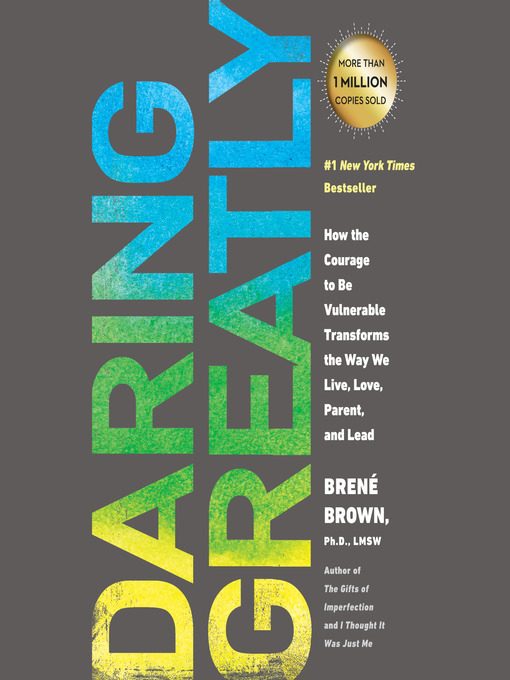 Next on the list is Daring Greatly by Brene Brown. I love to recommend this book as it offers a shift in thinking towards vulnerability, offering it as a superpower.
Next on the list is Daring Greatly by Brene Brown. I love to recommend this book as it offers a shift in thinking towards vulnerability, offering it as a superpower.
The book covers topics such as shame resilience, and the power of embracing imperfections. For instance, Brown shares research on how vulnerability can lead to more meaningful connections and personal growth. She provides specific examples of individuals who have transformed their lives by being vulnerable and open, such as leaders who foster innovation through vulnerability in the workplace.
Through the book, readers can gain a deeper understanding of their own vulnerability, learn to navigate shame, and develop resilience. Brown’s practical strategies, like the “Daring Greatly” manifesto, can empower readers to take courageous steps toward embracing their authentic selves and building more fulfilling relationships. She also highlights the idea of personal armor that we all carry and suggests that to embrace our authentic selves, we must shed this protective layer and unveil our true identities. Throughout the book, she guides us in recognizing the various forms of armor we might employ and provides strategies for dismantling them.
Overall, Daring Greatly aligns with a reader’s goal of promoting self-acceptance, resilience, and healthier connections in the therapeutic journey. Daring Greatly delves into the concept of embracing wholehearted living, and presenting our genuine selves when confronted with uncertainty, self-doubt, and the unknown. If you’re looking to read a book that is inspiring, and does not necessarily tie into the deeper traumatic or triggering themes, this may be a top choice for you.
“As children we found ways to protect ourselves from vulnerability, from being hurt, diminished, and disappointed. We put on armor; we used our thoughts, emotions, and behaviors as weapons; and we learned how to make ourselves scarce, even to disappear. Now as adults we realize that to live with courage, purpose, and connection — to be the person whom we long to be — we must again be vulnerable. We must take off the armor, put down the weapons, show up, and let ourselves be seen.” -Chapter 4 (The Vulnerability Armory), Daring Greatly
5. It Didn’t Start with You by Mark Wolynn
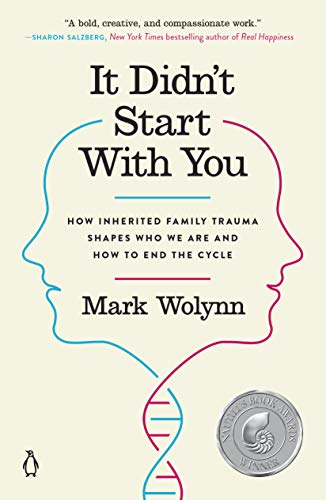 While I may enthusiastically recommend this book, I suggest proceeding with caution. This book delves deep into the fascinating world of inherited family trauma and how it can unconsciously shape our lives. Through gripping case studies and real-life stories, Wolynn describes the impact of generational trauma on individuals’ emotional well-being and relationships. By exploring themes of intergenerational patterns, unresolved family secrets, and the transmission of pain through generations, the book empowers readers to recognize and break free from the invisible chains that may bind them to their family’s history. It sheds light on why certain life patterns, fears, or anxieties seem to persist despite our best efforts to overcome them, offering a path toward healing and self-discovery.
While I may enthusiastically recommend this book, I suggest proceeding with caution. This book delves deep into the fascinating world of inherited family trauma and how it can unconsciously shape our lives. Through gripping case studies and real-life stories, Wolynn describes the impact of generational trauma on individuals’ emotional well-being and relationships. By exploring themes of intergenerational patterns, unresolved family secrets, and the transmission of pain through generations, the book empowers readers to recognize and break free from the invisible chains that may bind them to their family’s history. It sheds light on why certain life patterns, fears, or anxieties seem to persist despite our best efforts to overcome them, offering a path toward healing and self-discovery.
Reading this book may unveil a hidden family history of wartime trauma or familial secrets that have been inadvertently influencing their emotional landscape. Armed with this knowledge, you can begin to work through and release these inherited burdens, leading to a transformation in your mental and emotional well-being.
Moreover, It Didn’t Start with You highlights the importance of compassion and forgiveness towards oneself and one’s ancestors. It encourages individuals to approach their family’s past with understanding rather than blame, fostering a sense of liberation and peace. This book is a powerful tool for unraveling the intricate web of generational trauma, ultimately guiding clients toward a path of self-awareness, healing, and the opportunity to live a life more aligned with their true selves.
The proceed with caution warning comes at this point with a minor spoiler alert. The author discusses the importance of forgiving/making peace with familial members as they may not have been aware of the generational burdens themselves. If you are in a space at this time where you are going “no contact” with family members, it may be best to check out some other recommendations on this list.
“When family members lead unhappy lives or suffer an extremely difficult fate, it’s often easier to reject them than to feel the pain of loving them. Anger is often an easier emotion to feel than sadness.” -Page 96, It Didn’t Start With You
6. When You’re Ready, This is How You Heal by Briana Wiest
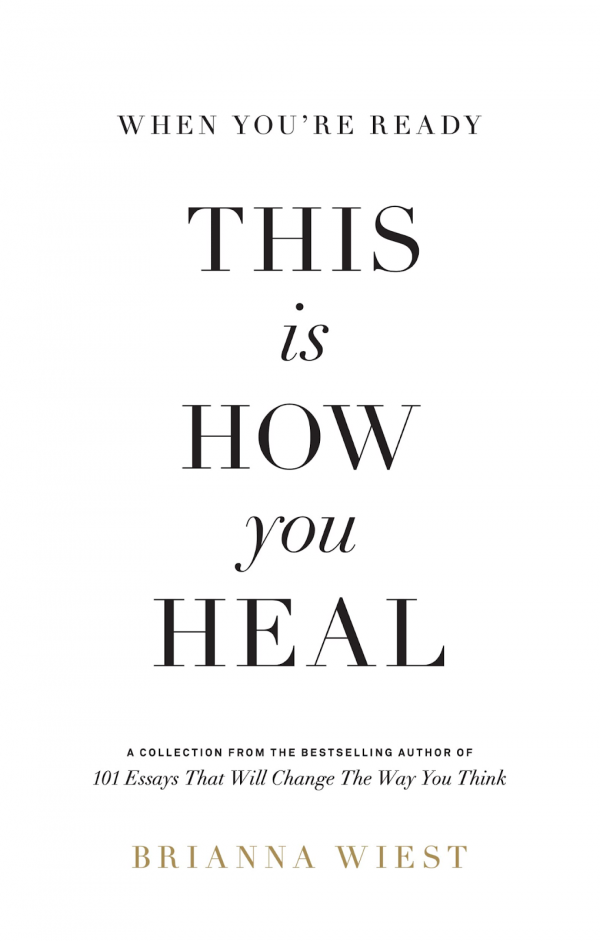 When You’re Ready, This Is How You Heal explores the art of new beginnings, guiding us through the intricacies of the process while debunking common misconceptions that hinder our progress. This book is a source of empowerment and inspiration, making it an essential addition to your reading list.
When You’re Ready, This Is How You Heal explores the art of new beginnings, guiding us through the intricacies of the process while debunking common misconceptions that hinder our progress. This book is a source of empowerment and inspiration, making it an essential addition to your reading list.
Healing is a journey, not a singular event. It often commences with a significant moment – frequently triggered by an unforeseen loss that shatters our expectations of the future. It offers a structured approach to healing from emotional wounds and trauma, making it an excellent resource for clients who may be struggling with past or current challenges. Additionally, the book encourages self-reflection and introspection, which aligns with many therapeutic techniques aimed at promoting self-awareness and personal growth.
Briana Wiest’s empathetic and compassionate writing style resonates with readers, creating a sense of connection and validation. Embracing change, considering setbacks as opportunities, the “illusion” of falling behind in life, and breaking from the chains of your comfort zone are all topics readers with trauma may need to master. Overall, this book can serve as a powerful supplement to therapy, helping you to navigate their healing journey with greater insight and resilience. It can help us look at our experiences differently, constructing a new narrative about your experiences and overall life.
“To trust yourself means that you are no longer content to lodge your soul in the circumstances that have long stopped serving you… Healing is the ultimate vulnerability… It does not mean we have to arrive on the other side magically declaring that we’re the victor, but that we show up humbly, with our hearts wounded but open. Healing is to accept the hurting as part of being human ” – Page 101, When You’re Ready, This is How you Heal
7. The Power of Attachment by Diane Poole Heller
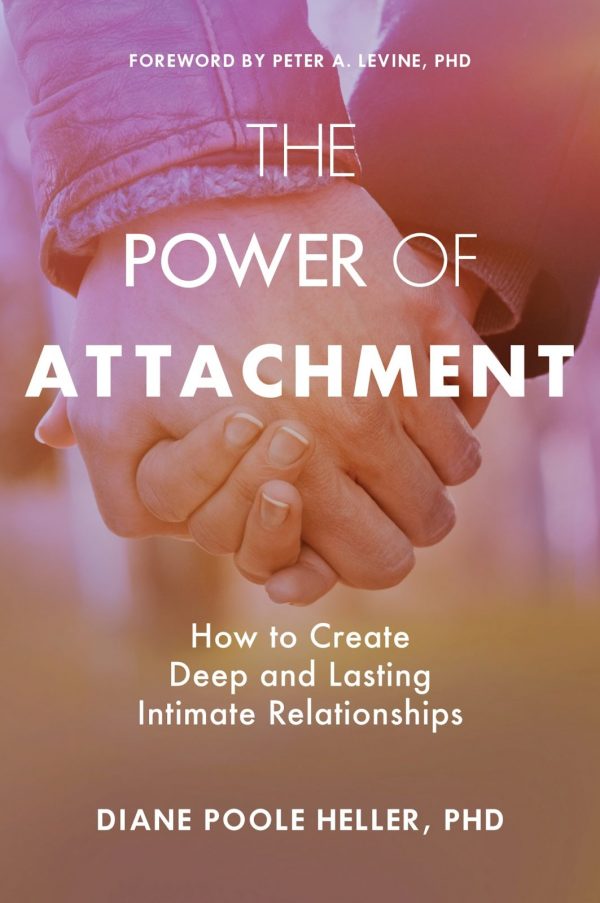 As a therapist, I often recommend reading The Power of Attachment and similar books to my clients for various reasons. These books provide valuable education and understanding of attachment theory, helping individuals grasp how it influences their relationships and emotional well-being.
As a therapist, I often recommend reading The Power of Attachment and similar books to my clients for various reasons. These books provide valuable education and understanding of attachment theory, helping individuals grasp how it influences their relationships and emotional well-being.
If you’ve ever struggled with codependency, anxiety-related responses towards needs for closeness and reassurance, difficulties with vulnerability, or difficulties with emotional distance, this book provides powerful insight towards our individual attachment systems. Insecure attachment is explained as a relational pattern marked by inconsistent or unpredictable emotional bonds and behaviors in relationships, often stemming from unresolved childhood experiences impacting adult relationships.
Reading this book encourages self-reflection, which can help identify patterns in your relationships or gain insight into your personal attachment styles. There are numerous mindful and self-reflection activities included within the book. For those who’ve experienced attachment-related challenges or trauma, these readings can serve as a therapeutic process, fostering healing and growth. Moreover, they can significantly improve relationships by providing insights into attachment dynamics. This book can empower clients with knowledge, and equips them with tools for positive change. Ultimately, reading books on attachment is a valuable supplement to therapy, aiding clients on their journey toward healthier connections and personal growth.
“I’ve also started thinking of trauma in terms of connection. The theme of broken connection has come up in my work repeatedly over the years: broken connection to our body; broken connection to our sense of self; broken connection to others, especially those we love; broken connection to feeling centered or grounded on the planet; broken connection to God, Source, Life Force, well-being, or however we might describe or relate to our inherent sense of spirituality, openhearted awareness, and beingness. This theme has been so prominent in my work that broken connection and trauma have become almost synonymous to me.” –Page 5, The Power of Attachment
8. The Mountain Is You by Briana Wiest
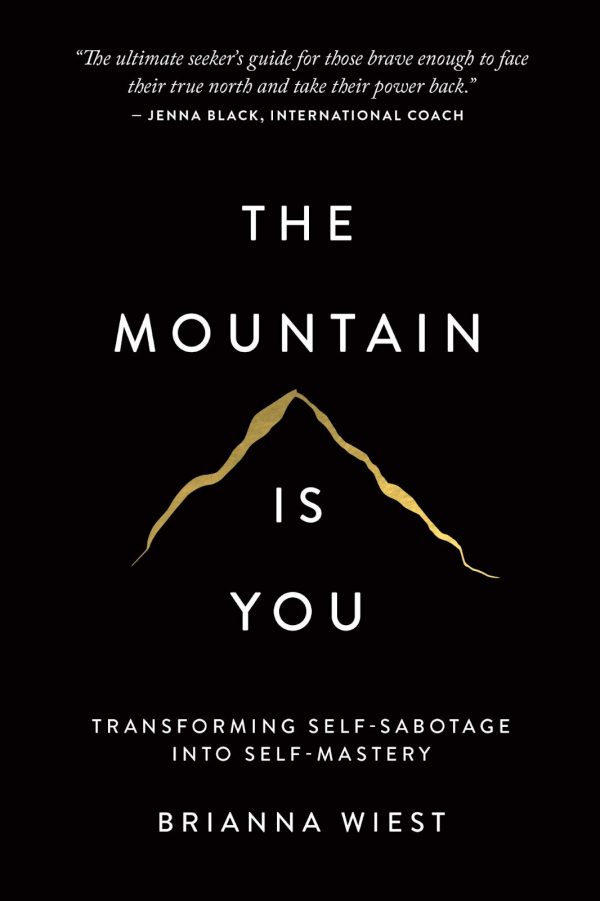 In The Mountain Is You by Brianna Wiest, the spotlight is on the obstacle standing between you and the life you aspire to lead. Through the metaphor of a mountain, the author elucidates how your imperfections, life experiences, insecurities, and past hardships have gradually accumulated over time, creating your unique challenge that must be surmounted to facilitate personal growth.
In The Mountain Is You by Brianna Wiest, the spotlight is on the obstacle standing between you and the life you aspire to lead. Through the metaphor of a mountain, the author elucidates how your imperfections, life experiences, insecurities, and past hardships have gradually accumulated over time, creating your unique challenge that must be surmounted to facilitate personal growth.
A favorite sentiment I like to use in sessions is “Your own mind can be your own worst enemy.” This book highlights this premise as to how our limiting beliefs can prevent us from living the life we truly want to live. It serves as a source of inspiration, reminding readers that they possess the strength to conquer their personal mountains and emerge stronger. Finally, it emphasizes the importance of personal accountability and motivation for change that comes from within.
“Your new life is going to cost you your old one. It’s going to cost you your comfort zone and your sense of direction. It’s going to cost you relationships and friends. It’s going to cost you being liked and understood. It doesn’t matter… All you’re going to lose is what life was built for a person you no longer are. Remaining attached to your old life is the first and final act of self-sabotage, and releasing it is what we must prepare for to truly be willing to see a real change.” – Page 26, The Mountain is You
9. Set Boundaries, Find Peace by Nedra Glover Tawwab
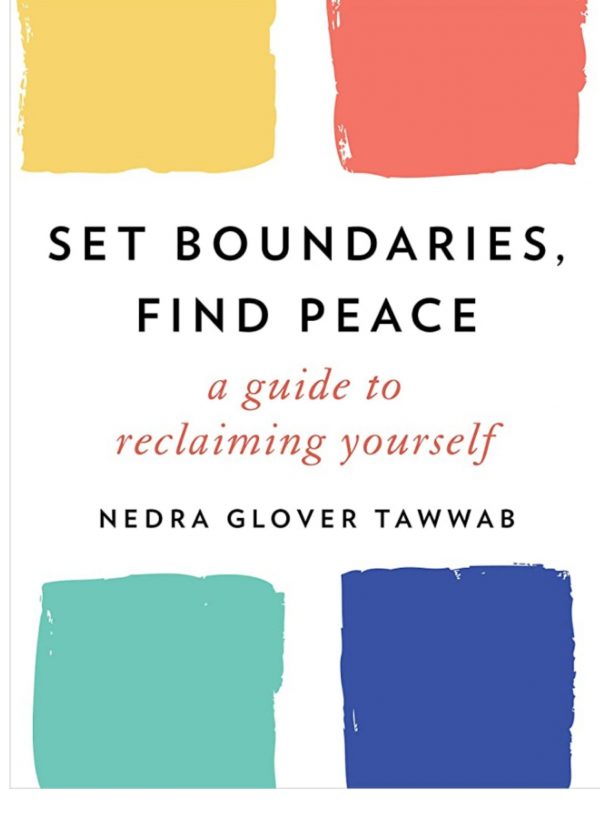 The author of Set Boundaries, Find Peace is a therapist herself, integrating cognitive behavioral therapy techniques as to how we can set boundaries with others. The biggest misconception about boundaries is that they have to be hostile. The author challenges the potential reader’s way of thinking as it relates to boundary-setting.
The author of Set Boundaries, Find Peace is a therapist herself, integrating cognitive behavioral therapy techniques as to how we can set boundaries with others. The biggest misconception about boundaries is that they have to be hostile. The author challenges the potential reader’s way of thinking as it relates to boundary-setting.
Survivors of trauma often find that boundaries are difficult to set with others. Nedra Tawwab’s book aims to empower readers to take control of their lives, make space for self-care, and cultivate healthier, more fulfilling relationships by setting and enforcing boundaries that align with their values and needs. Tawwab delves into the concept of boundaries, elucidating their essence and offering insights into their establishment.
Drawing upon her wealth of experience as a therapist, Tawwab delves into the underlying causes behind individuals’ challenges in defining boundaries in their interactions and the outcomes that arise when others dictate the terms of a relationship. Nedra has also published a Set Boundaries, Find Peace workbook that allows the reader to explore their feelings related to boundaries, and explore times when their boundaries have been violated in childhood.
“The ability to say no to yourself is a gift. If you can resist your urges, change your habits, and say yes to only what you deem truly meaningful, you’ll be practicing healthy self-boundaries. It’s your responsibility to care for yourself without excuses.” –Page 151, Set Boundaries, Find Peace
Conclusion
I’ve come to realize in my professional practice that trauma is not just a wound to be healed. It’s a story to be understood, acknowledged, and rewritten with resilience and self-compassion.
Sometimes, we may need professional help to aid in writing, telling, or understanding of the narrative of resilience.
If you are struggling with trauma, please don’t hesitate to reach out to Exceptional Wellness Counseling. A licensed therapist can help you make sense of what you’ve gone through and find meaning in your life as you work through those struggles.
Allison Rosa is a Certified Trauma Professional, who specialized in Victim Counseling during her graduate program. Using person-centered techniques, Allison helps others to rewrite their trauma narratives. Allison is also an EMDR-trained therapist.
Check out Allison’s professional bio here.
Email Us: info@exceptionalwellnesscounseling.com
Call Now: (908) 415-2042
NEXT STEPS & RESOURCES
-
- Are you ready to take your first step? Reach out to us.
- Do you feel you maybenefit from counseling during this time? Take the first step.
- Interested in online counseling? Learn more.
- Interested in group counseling? Learn More

